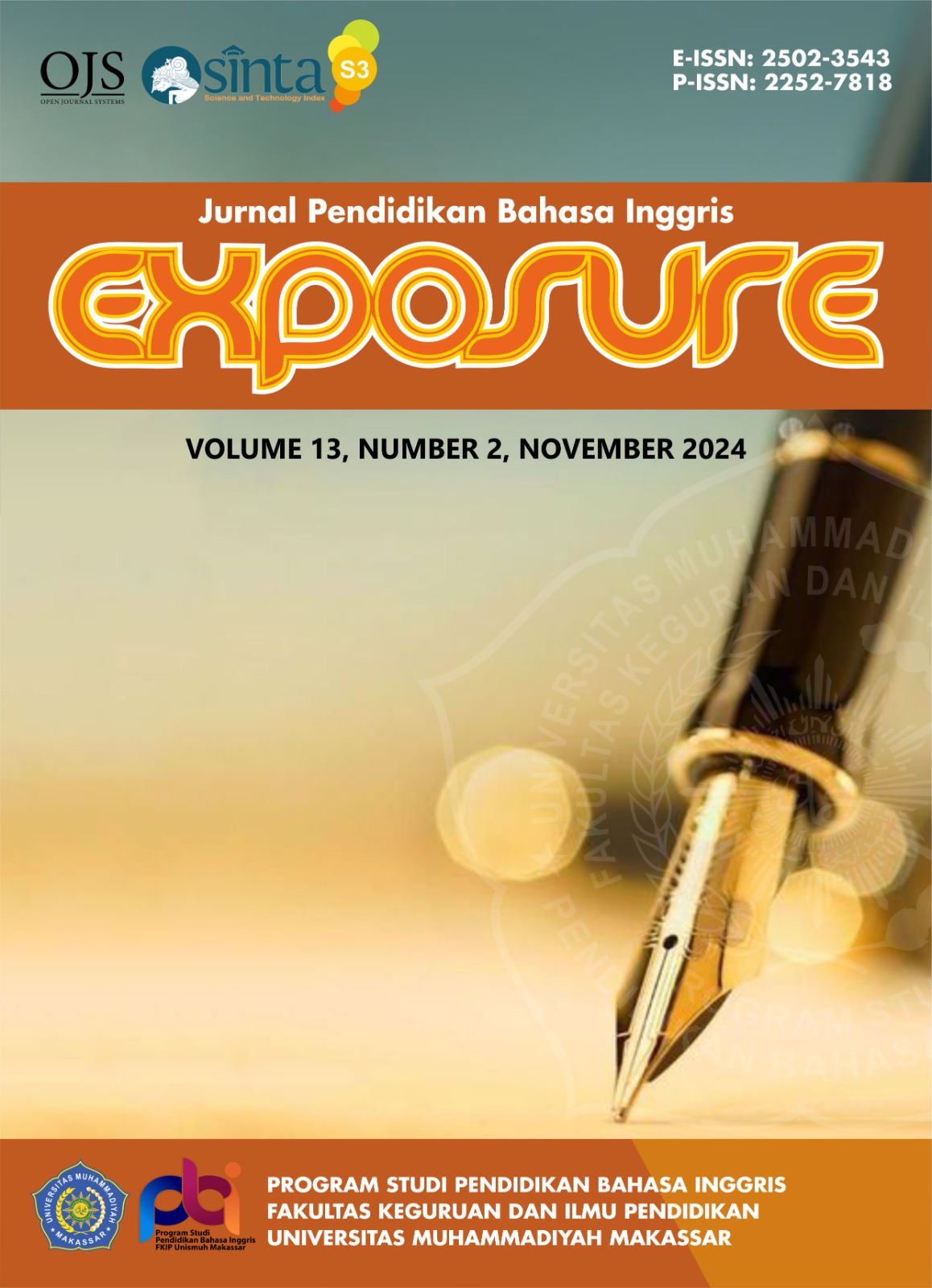TEACHER’S PERCEPTION OF BRAIN GYM EXERCISES TO BUILD STUDENTS LEARNING MOTIVATION
DOI:
https://doi.org/10.26618/exposure.v13i2.15689Keywords:
brain gym, students learning motivation, teacher’s perceptionAbstract
Motivation is an important factor that influences student success. Teachers' perceptions are needed regarding the phenomenon of decreased learning motivation experienced by students. This study aims to find out about how teachers' perceptions of using Brain Gym to increase student learning motivation and how the results obtained after doing brain gym on student learning concentration. The method used in this study uses a qualitative approach with a descriptive design to provide an overview of teacher perceptions about the use of Brain Gym to build student learning motivation. The researcher conducted interviews to answer the question instruments asked. The interview includes questions, documentation sheets and other supporters. In this study applying convenience sampling, this sampling technique involves people who are easily reached and contacted by researchers. The results showed that almost all teachers have the same opinion that using brain gym can build student learning motivation. Therefore, the use of brain gym can be an example of cool and fun learning. This research has limitations in time and place. So it can be concluded that brain gym has a good effect on student learning motivation, besides helping teachers to be creative in the learning process.References
Agus Muslim, Dkk. (2024). Peningkatan Motivasi Belajar Siswa Melalui Brain GYM Pada Siswa SMPN 3 Pare Kabupaten Kediri KEDIRI. Jurnal Insan Cendekia, 11(1), 71-79
Akhmad Sukri, E. P. (2016). Meningkatkan Hasil Belajar Siswa Melalui Brain GYM. Jurnal Edukasi Matematika dan Sains, 1(1), 50-57
Andria Pragholapati, R. S. (2019). Pengaruh Brain GYM Terhadap Tingkat Depresi Pada Lansia di Balai Perlindungan Sosial Tresna Werdha Ciparay Bandung . Jurnal Skolastik Keperawatan, 5(2), 128-146
Arikunto, S. (2010). Research Procedure A Practical Approach. Jakarta: Rineka Cipta
Borah, m. (2021). Motivation in Learning. Journal Of Critical Reviews, 8(2), 550-552
Fitri Jayanti, N. T. (2018). Persepsi Mahasiswa Terhadap Pelayanan Perpustakaan Universitas Trunojoyo Madura. Jurnal Ilmiah Universitas Trunojoyo Madura, 12(2), 205-223
Handryastuti, T. S. (2002). Senam Otak. Sari Pediatri, 4(1), 36-44
Huda, A. K. (2017). Persepsi direktur dan tenaga medis terhadap layanan bimbingan rohani Islam dan relevansinya dalam meningkatkan kualitas layanan di RSUD Ambarawa. Semarang: Repository UIN Walisongo
Moleong, L. J. (2017). Metodologi penelitian kualitatif . Bandung: PT. Remaja Rosdakarya
Muaidi, M. (2019). Motivasi Belajar Bahasa Inggris Praja Pada Institut Pemerintahan Dalam Negeri (IPDN) Kampus Nusa Tenggara Barat Tahun Ajaran 2016/2017. Jurnal Asy-Syukriyyah, 20(1), 86-109
Nawawi, H. (2005). Metode Penelitian Bidang Sosial. Yogyakarta: Gadjah Mada University Press
Nurlika, H. d. (2021). Tingkat Konsentrasi Belajar Anak pada Siswa Kelas IV SD melalui Brain Gym (Senam Otak). Jurnal Keperawatan Silampari, 5(1), 222-232
Pratama, W. N. (2020). Brain Gym Optimizing Concentration on Elementary Students. STRADA Jurnal Ilmiah Kesehatan, 9(2), 1524-1532
Rahman, S. (2021). Pentingnya Motivasi Belajar Dalam Meningkatkan Hasil Belajar. Pascasarjana Universitas Negeri Gorontalo, 289-302
Sobur, A. (2013). Psikologi Umum dan Lintasan Sejarah. Bandung: CV. Pustaka Setia
Sujanto, B. (2018). Pengelolaan Sekolah: Permasalahan dan Solusi. Jakarta: Bumi Aksara
Taroreh, B. (2021). Analisis Tematik Data Kualitatif Pada Pengembangan perangkat Pembelajaran Paradigma Pedagogi Reflektif (PPR). SNFKIP 2021: Pendidikan Bagi Masyarakat di Daerah 3T, 167-176
Vaishnavi V Siroya, W. M. (2021). Brain gym exercises: an approach in improving the psychological perception in graduate students. Journal of medical pharmaceutical and allied sciences, 10(5), 3636-3639
Widarti, E. A. (2023). Pengaruh Brain GYM Terhadap Penurunan Tingkat Stress Pada Mahasiswa di Kelompok Karang Taruna Kota Surakarta. Physio Journal, 3(1), 34-40
Downloads
Published
Issue
Section
License
Authors who publish with this journal agree to the following terms:
In order to assure the highest standards for published articles, a peer review policy is applied. In pursue of the compliance with academic standards, all parties involved in the publishing process (the authors, the editors and the editorial board and the reviewers) agree to meet the responsibilities stated below in accordance to the Journal publication ethics and malpractice statement.
Duties of Authors:
- The author(s) warrant that the submitted article is an original work, which has not been previously published, and that they have obtained an agreement from any co-author(s) prior to the manuscript’s submission;
- The author(s) should not submit articles describing essentially the same research to more than one journal;
- The authors(s) make certain that the manuscript meets the terms of the Manuscript Submission Guideline regarding appropriate academic citation and that no copyright infringement occurs;
- The authors(s) should inform the editors about any conflict of interests and report any errors they subsequently, discover in their manuscript.
Duties of Editors and the Editorial Board:
- The editors, together with the editorial board, are responsible for deciding upon the publication or rejection of the submitted manuscripts based only on their originality, significance, and relevance to the domains of the journal;
- The editors evaluate the manuscripts compliance with academic criteria, the domains of the journal and the guidelines;
- The editors must at all times respect the confidentiality of any information pertaining to the submitted manuscripts;
- The editors assign the review of each manuscript to two reviewers chosen according to their domains of expertise. The editors must take into account any conflict of interest reported by the authors and the reviewers.
- The editors must ensure that the comments and recommendations of the reviewers are sent to the author(s) in due time and that the manuscripts are returned to the editors, who take the final decision to publish them or not.
Authors are permitted and encouraged to post online a pre-publication manuscript (but not the Publisher’s final formatted PDF version of the Work) in institutional repositories or on their Websites prior to and during the submission process, as it can lead to productive exchanges, as well as earlier and greater citation of published work (see The Effect of Open Access). Any such posting made before acceptance and publication of the Work shall be updated upon publication to include a reference to the Publisher-assigned DOI (Digital Object Identifier) and a link to the online abstract for the final published Work in the Journal.

